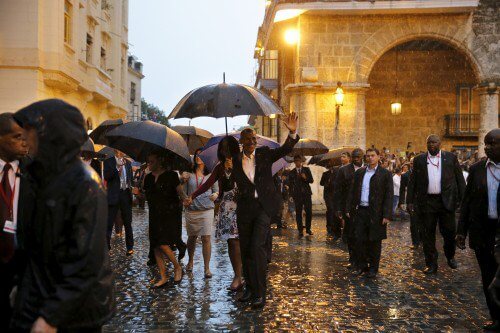Ricochet is the best place on the internet to discuss the issues of the day, either through commenting on posts or writing your own for our active and dynamic community in a fully moderated environment. In addition, the Ricochet Audio Network offers over 50 original podcasts with new episodes released every day.
 In Cuba, More US Tourists Can Now Sightsee a Repressive Dictatorship. Enjoy!
In Cuba, More US Tourists Can Now Sightsee a Repressive Dictatorship. Enjoy!
 The headline from a new IHS Global report on US-Cuba relations sums things up pretty well: “Deeper US engagement with Cuba to increase trade and investment, especially in the tourism sector, but democratic political reform unlikely.” And from the report itself (bold is mine):
The headline from a new IHS Global report on US-Cuba relations sums things up pretty well: “Deeper US engagement with Cuba to increase trade and investment, especially in the tourism sector, but democratic political reform unlikely.” And from the report itself (bold is mine):
Published in Economics, Foreign PolicyThe changes represent the most significant shift since President Obama and Cuban president Raúl Castro restored relations in December 2014. In particular, removing the threat to foreign banks of being fined in the US for conducting dollar transactions with Cuba is likely to provide a boost to FDI particularly in the tourism and telecoms sectors. In addition, the shipping reform will permit ferries and cruise vessels to visit Cuban ports. This, alongside the easing of the travel permit, will further extend the Cuban travel boom. Thus, with US companies now being able to manufacture in Cuba, commercial flights about to begin in 2016, and US key hoteliers being given approval to manage hotels in Cuba, the way is open for continuing economic growth in Cuba and a concomitant increase in living standards. Allowing Cubans to earn US salaries removes a key obstacle though it is still pending how this will be implemented in practice. …
Despite the advances proposed by the US, the response from the Cuban government to implement clarifying policy changes has been relatively modest. Thus, while it is increasingly possible for US firms to conduct business in Cuba from the US under the terms allowed by the US Treasury and the Department of Commerce, businesses separately aiming to engage directly with the island authorities on Cuban soil have not been given any clarity. A key issue to take into account are the still-existing sanctions derived from the embargo which will imply higher costs for businesses operating in Cuba in terms of compliance and regulatory risks to avoid them.
Furthermore, there remains the fact that Cuba is still a hostile environment for businesses with no link to the Cuban political elite and no guarantees of international investment arbitration. Nevertheless, the new easing relieves pressure on Havana to undertake significant democratic changes, reducing momentum for any meaningful change in the Cuban political system in the next few years.
Some constitutional changes appear likely after the Communist Party Congress in April, such as allowing more candidates to run for the Communist Party of Cuba (Partido Comunista de Cuba: PCC), introducing a form of primary elections permitting popular selection of candidates, and granting more autonomy for the provinces. However, such changes fall short of major reform to the single party system. This is likely to remain in place for the foreseeable future, potentially until a sizable Cuban middle class can be created to demand political change. Political change is thus likely to be limited in the two-year outlook until Castro leaves office, expected in 2018. The dynamics for change will be further limited by the systematic approach of Cuba’s security and intelligence apparatus to detain and harass dissidents, while blocking mass anti-government protests or free media in Cuba.




“Cuban middle class.” Communist societies are classless. Everyone knows that!
Oh, the irony.
Foreign investors can only enter as partners with the government, meaning no local entrepreneurs, no local dollar earners, no spill over out side the inner circle and security apparatus, so where is this middle class suppose to come from that will demand changes. Every thing the Cubans have done over the last several dozen years is to position the nomenclatura to survive the death of the Castros. Even the Venezuelan takeover should be interpreted in this light. They lack the Castro mystique and charisma and will survive only through repression. It will get worse not better at least in the short and maybe medium term. On the other hand they can flee to Caracas which is it’s role, but if things keep changing in Venezuela, then it’s Bolivia. Perfect. That’s where Che met his end. Obama has extended the regime, but not by much. The liberalization it will bring about is a myth. Cuba has been open to the whole world for years. It’s that they are not internally open and any who might oppose are either in Jail or in Miami. There is nothing in this deal that will help Cuba end the Castro tyranny. Quite the contrary.
Wait, I thought we were “imposing a get tough policy.” I know this because a certain Republican Senator who went on the President’s trip to Cuba told me so.
Didja know that the last President to visit Cuba was … Calvin Coolidge?
Ricochet’s spiritual mascot wins again!
His visit was in 1928, a whole 32 years before the embargo was imposed.
Ooh. Here’s hoping President Trump brings back that tradition for state visits!
the liberalization myth hasn’t worked in China either. Actually under Xi Jinping the Communist Party has redoubled its efforts on control over media and access to internet among other things.
That headline is perfect.